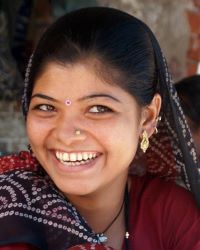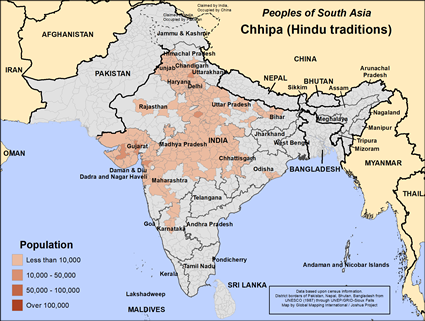Chhipa (Hindu traditions) in Pakistan

Photo Source:
Copyrighted © 2026
Isudas All rights reserved. Used with permission |

Map Source:
People Group data: Omid. Map geography: UNESCO / GMI. Map Design: Joshua Project.
|
| People Name: | Chhipa (Hindu traditions) |
| Country: | Pakistan |
| 10/40 Window: | Yes |
| Population: | 1,500 |
| World Population: | 456,500 |
| Primary Language: | Sindhi |
| Primary Religion: | Hinduism |
| Christian Adherents: | 0.00 % |
| Evangelicals: | 0.00 % |
| Scripture: | Complete Bible |
| Ministry Resources: | Yes |
| Jesus Film: | Yes |
| Audio Recordings: | Yes |
| People Cluster: | South Asia Hindu - other |
| Affinity Bloc: | South Asian Peoples |
| Progress Level: |
|
Introduction / History
The word "Chhipa" comes from the Gujarati word "Chhapa" which means to print. Traditionally, the Chhipa people have worked in the textile and clothing industries. During the Partition of India in 1947, many Hindus left Pakistan and moved to India. At the same time, many Muslims left India to live in Pakistan.
Chhipa people lived first in Nagaur in Rajasthan, India. Today the large majority of Chhipa live in the northern and western states of India. A tiny population resides in southern Pakistan.
The two primary languages of the Chhipa in Pakistan are Sindhi and Dhakti. Chhipa also speak Urdu, the national language of Pakistan. Educated Chhipa speak English. Many Bible resources exist in Urdu and Sindhi.
What Are Their Lives Like?
The Chhipa are known to dye and print of fabrics in red, blue and black patterns. Some Chhipa own the textile factories while other work in them as managers and laborers. Some Chhipa sell and trade the textiles and clothing they make. Some Chhipa work outside the clothing industry in retail, construction, education, and manufacturing.
The Chhipa community is divided into a number of clans, known as ataks, the main ones being the Rao, Tak, Bhati, Doera, Chauhan, Molani and Sonava. The clans intermarry, but the Chhipa favor marriage to cousins to keep the wealth inside the family.
The Hindu Chhipa of Pakistan are monogamous, that is they marry one spouse. Families and young people arrange marriages. Sons inherit property and take care of elderly parents and grandparents. Three or more generations often live under one roof. Parents encourage their children to attend and graduate from universities. Some children quit school early to help their parents make a living.
What Are Their Beliefs?
A Chhipa can be a Sikh, Hindu or a Muslim. This profile is focusing on the Hindu Chhipa. Hinduism is a catch-all phrase for the local religions of South Asia, so it is very diverse. At the popular level, Hindus worship and serve the gods of the Hindu pantheon. They visit Hindu temples and offer prayers, food, flowers, and incense to their gods in hopes of gaining protection and benefits. They do not have a personal or familial relationship with their gods as Christians do. There are other Hindus who are much more philosophical, especially among the Brahmins.
Almost all Hindus participate in yearly celebrations like Holi, the festival of colors and the start of spring / Diwali, the festival of lights / Navratri, the celebration of autumn / and Rama Navami, Rama's birthday.
What Are Their Needs?
One can only imagine the spiritual confusion involved with three major religions within one unreached people group. All Chhipa need open hearts to God and listen to his answers to their spiritual problems. Christ alone can forgive their sins and grant them eternal life.
Prayer Points
Pray that Chhipa people in Pakistan will be liberated by God's Holy Spirit from the many religious ties that bind them.
Ask the Lord to send loving workers to the Chhipa.
Pray for the Lord to multiply the reception and influence of his word among the Chhipas, leading them to love him with their whole being.
Pray for the Holy Spirit to anoint Chhipa families, especially the children and youth, and to raise up a new generation of fruitful, multiplying witnesses of Christ's mercy and love.